Unit 3 Could you please tell me where the restrooms are?SectionB 2a-2c 课件 (共43张PPT)
文档属性
| 名称 | Unit 3 Could you please tell me where the restrooms are?SectionB 2a-2c 课件 (共43张PPT) | 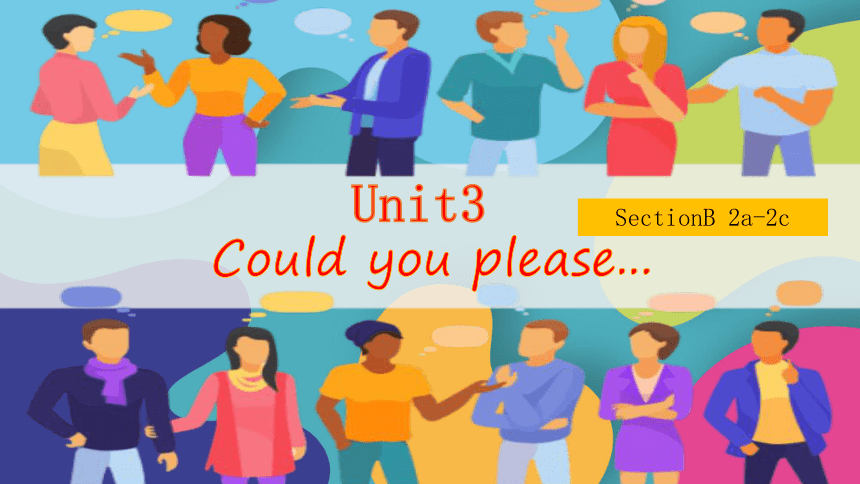 | |
| 格式 | zip | ||
| 文件大小 | 26.9MB | ||
| 资源类型 | 教案 | ||
| 版本资源 | 人教新目标(Go for it)版 | ||
| 科目 | 英语 | ||
| 更新时间 | 2022-09-28 06:40:53 | ||
图片预览

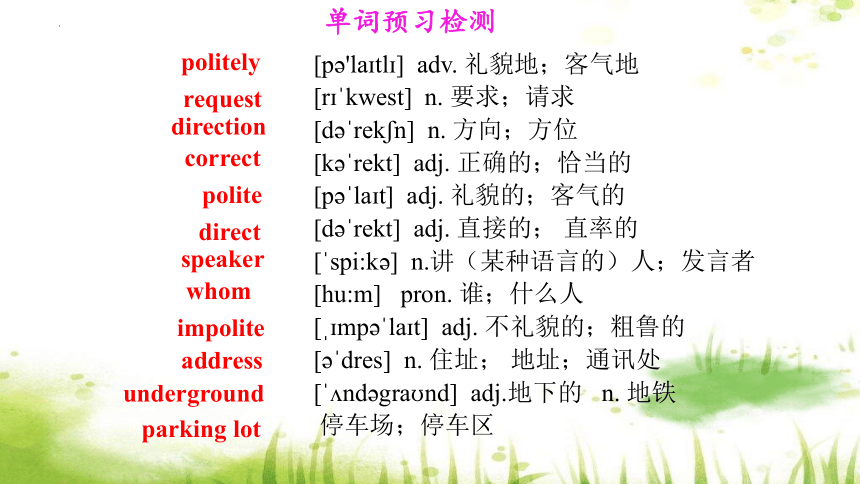
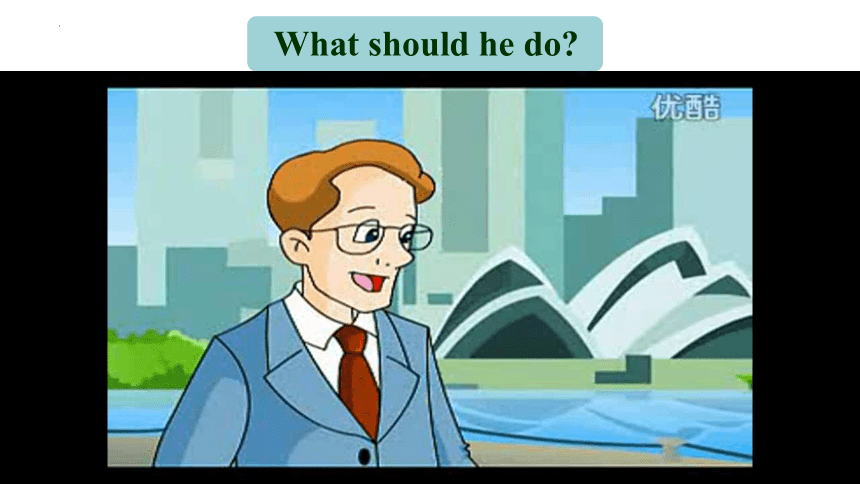
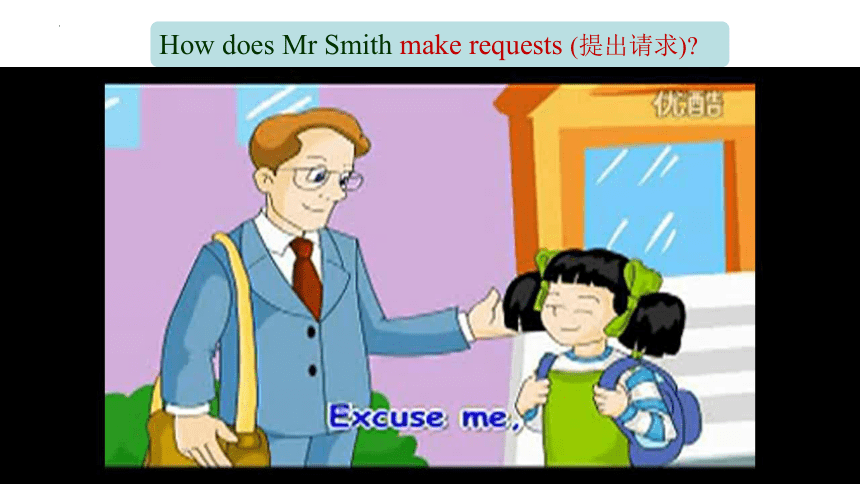
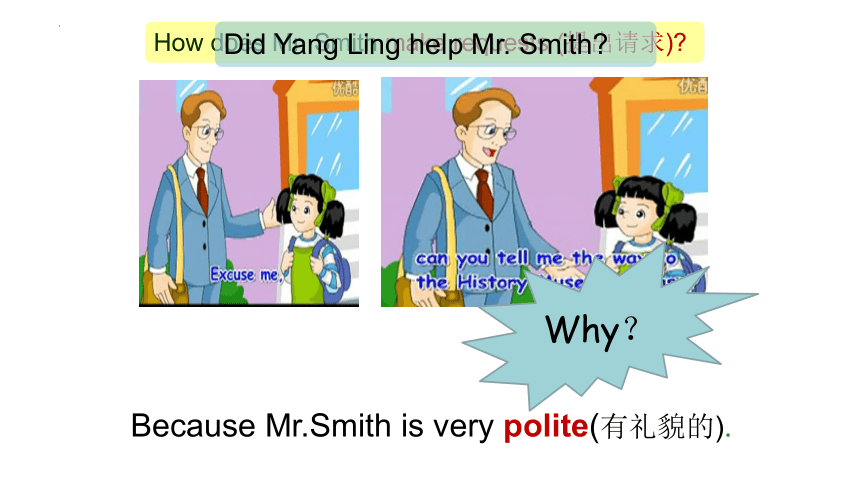
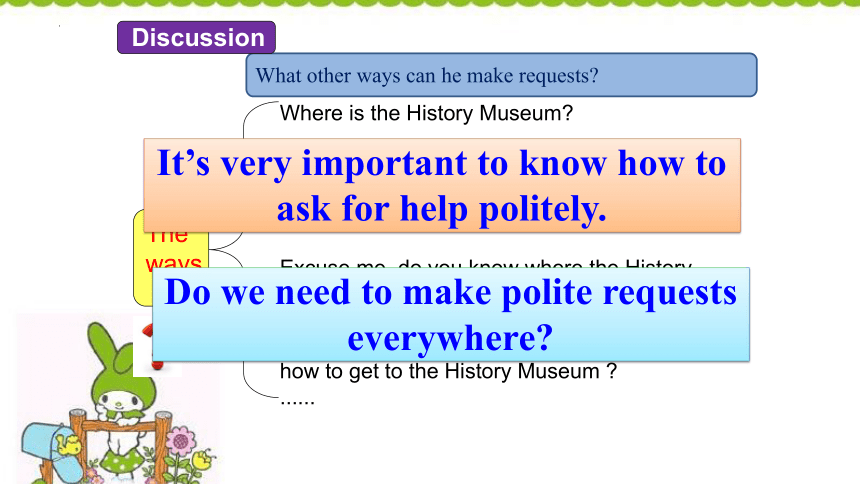
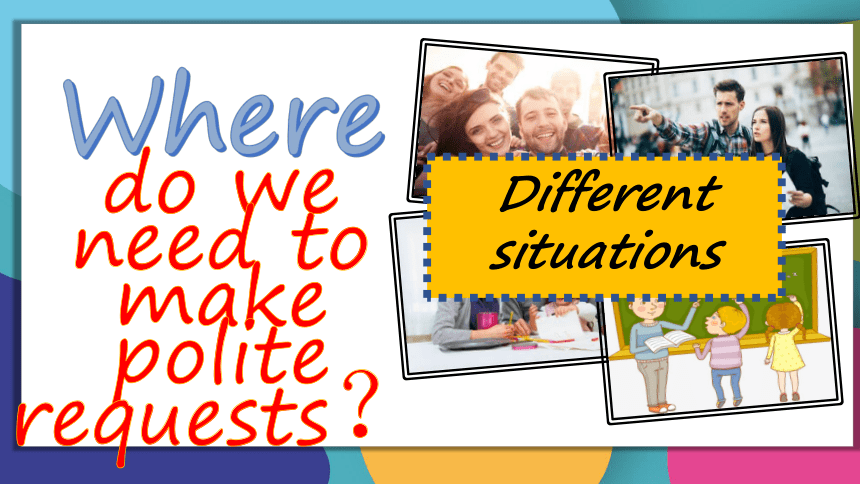
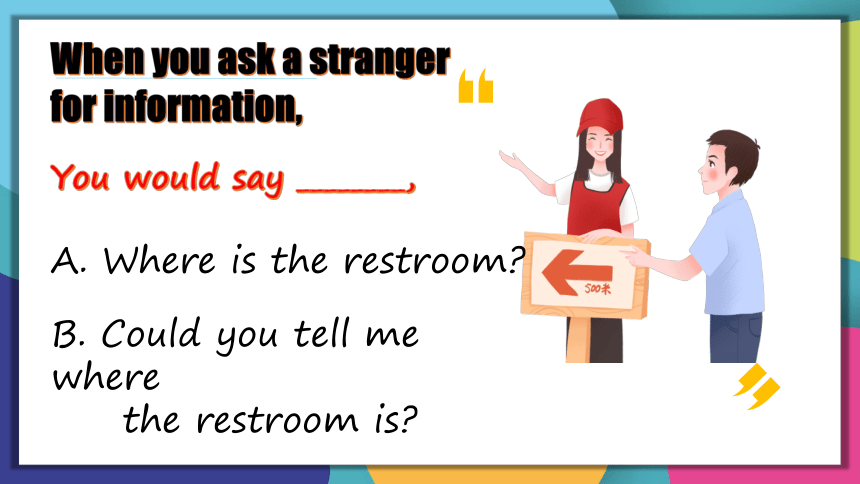
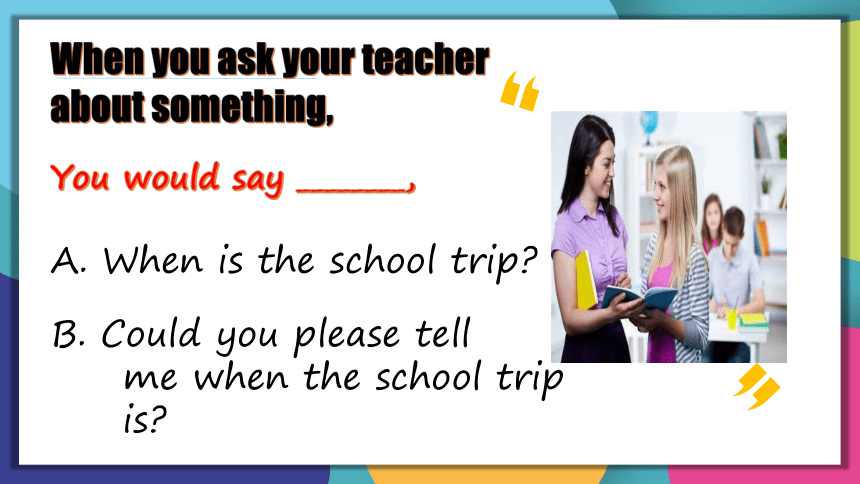
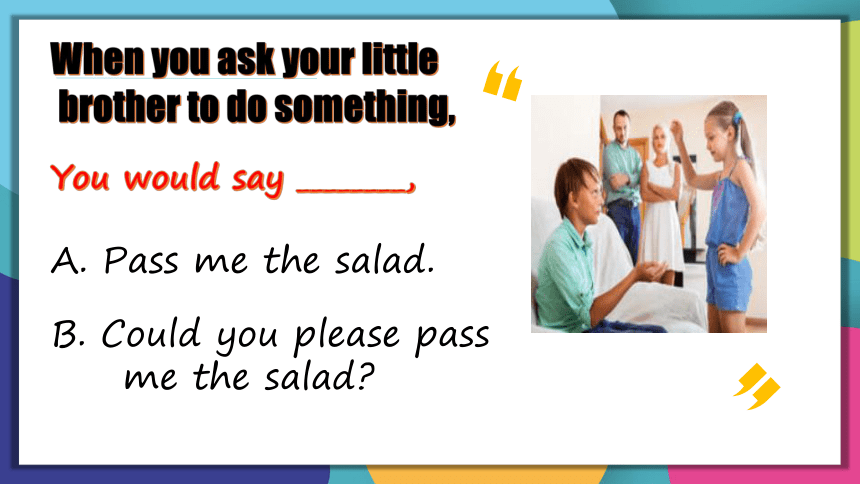
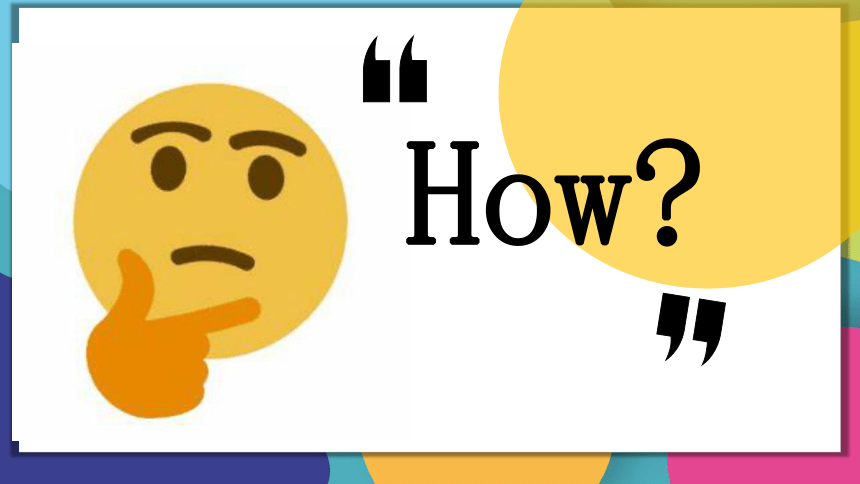
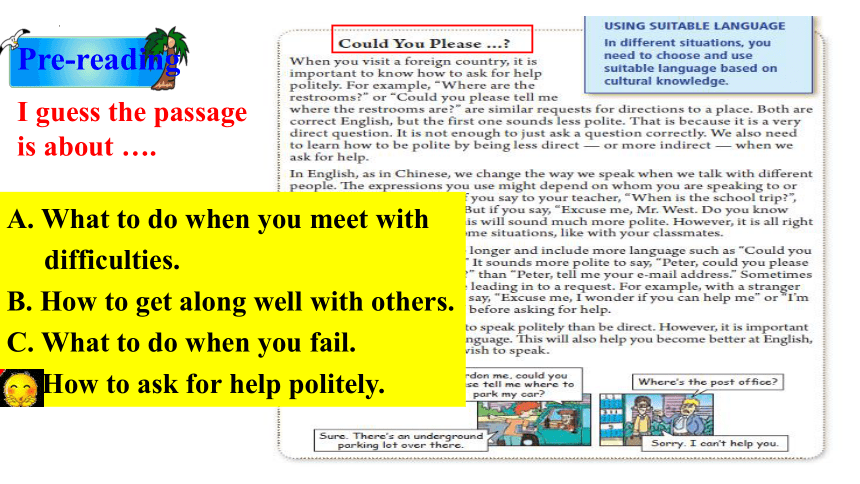
文档简介
(共43张PPT)
Unit3
Could you please...
SectionB 2a-2c
[p 'la tl ] adv. 礼貌地;客气地
[r kwest] n. 要求;请求
[d rek n] n. 方向;方位
[k rekt] adj. 正确的;恰当的
[p la t] adj. 礼貌的;客气的
[d rekt] adj. 直接的; 直率的
[ spi:k ] n.讲(某种语言的)人;发言者
[hu:m] pron. 谁;什么人
[ mp la t] adj. 不礼貌的;粗鲁的
[ dres] n. 住址; 地址;通讯处
[ nd gra nd] adj.地下的 n. 地铁
停车场;停车区
单词预习检测
politely
request
direction
correct
polite
direct
speaker
whom
impolite
address
underground
parking lot
What should he do
Mr. Smith
How does Mr Smith make requests (提出请求)
How does Mr. Smith make requests (提出请求)
Because Mr.Smith is very polite(有礼貌的).
Did Yang Ling help Mr. Smith
Why?
Where is the History Museum
How can I get to the History Museum
Could you tell me where the History Museum is
Excuse me, do you know where the History Museum is
I’m sorry to trouble you, could you please tell me how to get to the History Museum
......
The ways
What other ways can he make requests
Discussion
It’s very important to know how to ask for help politely.
Do we need to make polite requests everywhere
Where
do we
need to make polite requests?
Different situations
When you ask a stranger
for information,
You would say ________,
A. Where is the restroom
B. Could you tell me where
the restroom is
When you ask your teacher
about something,
You would say ________,
A. When is the school trip
B. Could you please tell
me when the school trip
is
When you ask your little
brother to do something,
You would say ________,
A. Pass me the salad.
B. Could you please pass
me the salad
How
A. What to do when you meet with difficulties.
B. How to get along well with others.
C. What to do when you fail.
D. How to ask for help politely.
Pre-reading
I guess the passage is about ….
Warming-up
Look and discuss.
Sure. There’s an underground parking lot over there.
Pardon me, could you please tell me where to park my car
Where are they
What is the man asking for
Does the boy help the man
Role-play the short conversation.
Warming-up
Where are they
What is the man asking for
Do they look happy
Will the man get help Why
Role-play the short conversation.
Who is better at asking for help Why
a direct question
a polite request
sounds impolite
speak politely
speak directly
Underline
the topic sentence of each paragraph.
When you visit a foreign country, it is important to know how to ask for help politely.
Good speakers change the way they speak in different situations.
Usually polite questions are longer.
It is important to learn how to use the right language in different situations.
Tip:
The topic sentence is usually the first or the second sentence
of each paragraph. Sometimes it is also in the middle of the paragraph.
Reading task
Match the main idea of each paragraph.
Paragraph 1
Paragraph 2
Paragraph 3
Paragraph 4
a) Use more words to help you sound more polite.
b) It is important to know how to ask for help politely.
c) Good English speakers need to know how to communicate well with other people.
d) The choice of language depends on the situation and the relationship between the speakers.
Could you please ...
When you visit a foreign country, it is important to know how to ask for help politely. For example, you may ask “Where are the restrooms ” or “Could you please tell me where the restrooms are ” These are similar requests for directions . Both are correct , but the first one sounds less polite. That is because it is a very direct question. It is not enough to just ask a question correctly. We also need to learn how to be polite when we ask for help.
Para. 1
Could you please tell me where the restrooms are
That is because it is a very __________ question.
direct questions
polite questions
Read Para 1 and choose the right answer.
______sounds less polite than ______
Where are the restrooms
A:
B:
Why?
direct
make requests
A
B
Can you find an example
Scanning
A: 有礼貌的B;直接的
C:正确的
HOw
Read Para2 carefully, and answer the questions.
How
do
good
learners
change
the way
they speak
in
different
situations
depends on
how well they know each other
whom they are speaking to
Please match the questions with correct situations
When is the school trip
Excuse me, Mr.West.Do you know when the school trip is?
classmates
close friends
teacher
old people
stranger
Read para3 and find out the features(特点) of polite questions
longer
polite questions
features
Could you please...
May I ask...
Excuse me,I wonder if you can help me..
I'm sorry to trouble you, but...
Longer questions can be more ______ and we need to spend time _____________before asking for help.
polite
leading into a request
4 It might seem more difficult to speak politely than directly. However, it is important to learn how to use the right language in different situations. This will help you communication better with other people.
Reading task
Read para4 carefully and finish the tasks.
1.In the sentence,“This will help you communicate better with other people.”,What does “this” refer to(指的是)
2.Why is it important to learn how to use the right language in different situations
To learn how to use the right language in different situations.
Because this will help you communicate better with other people.
Could you please tell me…
direct questions
polite questions
Where are…
make requests
When is …
teachers
People you know them well
/old people
/strangers
Excuse me, Mr West. Do you know…
features
Could you please ...
May I ask...?
Excuse me, I wonder if you can help me...
I’m sorry to trouble you, but...
longer
to whom
to whom
examples
examples
It’s very important to learn how to use the _____language in _______ situations.
right
different
Summary
What's the writer's purpose
It's important to learn how to use the right language in different situations.
The right language depends on the situation and the relationship between the speakers.
You can communicate better with other people.
Discussion
Politeness does no harm to people.
See people give a gift and walk ten miles less.
Good words are warm in winter, bad words are cold in March.
讲礼貌对人并无损害。
见人施一礼,少走十里路。
Proverbs about Politeness
好言一句三冬暖,恶语伤人三月寒。
Wish you a better man!
2d
Read the requests below. In the second column, write A if you would say it to someone you know and B if you would say it to a stranger. In the last column, write where you think these people are.
Request Person Place
1. Will you pass the salt
2. Do you know where I can change some money, please
3. Could you tell me what just happened
A
home
B
street
A/B
any public place/home
Request Person Place
4. Can you please tell me where the nearest station is
5. Excuse me, do you know what time it begins, please
6. Let me know when you’re ready, OK
7. Could you possibly tell me the way to the village school
B
street
B
movie theater
A
home
B
street
1. 提出礼貌的要求
2. 听起来更礼貌
3. 一个很直接的问题
4. 请求帮助
5. 在不同的情形下
6. 取决于
7. 你所用的表达方式
8. 比如
9. 花时间导入
10. 变得更擅长
Phrases summary
make polite requests
sound more polite
in different situations
ask for help
a very direct question
become better at
spend time leading in
such as
the expressions you use
depend on
1. …are similar requests for directions to a place.
Grammar
(1)request可数名词,其后常跟for,意为“要求/请求……”request可用作及物动词,其用法有:
①request sth. (from sb.)向某人请求……
②request sb. to do sth. 请求某人做某事。
③request+ that从句(从句用虚拟语气)
(2) direction n. 方向;方位
Which direction does your room face
ask for directions 问路;请教,请求指导
follow sb’s directions 听从某人的指教(指示,指挥)
keep sb’s directions in mind 记住某人的指示(指导)
give directions 发出指示 in all directions 四面八方
in every direction 四面八方 in the direction of 朝……方向
(1) depend on 取决于,依靠……
2. The expressions they use might depend on whom they are speaking to or how well they know each other.
①depend on + 名词
Living things depend on sunlight.
②depend on + V-ing
We can depend on his coming on time.
③depend on + 从句
That depends on how you do it.
(2) whom宾格人称代词, 意为“谁; 什么人”, 在句中作及物动词或介词的宾语。
①在口语和非正式用法中, whom放在句首时,常常被who所代替。例如: Who/Whom is he talking to
②若whom紧跟在介词之后,则不可被who所代替。例如: He is a man from whom we should all learn.
3. Sometimes we even need to spend time leading in to a request.
spend表示“花费”的两种常见结构
(1)spend+时间/金钱+(in)doing sth.
(2)spend+时间/金钱+on sth.
Spend… doing sth. 花费……做某事
如何表达“花费”:
(1) + spend+ / +on sth. /(in)doing sth.
(2) +pay+ +for sth.
(3)sth. +cost+ +
(4)It takes+ / +to do sth.
I. 单项选择。
1. The language you use depends ____ the relationship and situation.
A. in B. on
C. at D. for
Exercise
2. It’s important to know ____ along well with others.
A. how get B. how get to
C. how to get D. to get how
3. I wonder ____ you can come to my party next Sunday.
A. if B. why C. that D. where
4. —Can you tell me ______ you bought the gift for
—Sure. It’s for my best friend, Lucy.
A. where B. when C. how D. whom
5. It sounds more ______ to say, “Could you please tell me how to get to the station ”
A. direct B. polite C. politely D. impolite
II. 翻译下列句子。
1.他们要求再给一些帮助。
They _____________ for further aid.
2.孩子们依靠父母满足他们所有的需要。
Children _________ their parents for all of their needs.
made a request
depend on
( )(1)They spend too much time the report.
A. writing B. to write C. on writing D. write
( )(2)— Will you please for my dinner, Peter
— Sure!
A. spend B. pay C. cost D. take
A
B
( )(3)It me too much time to read this book.
A. took B. cost C. spent D. paid
( )(4)This science book me much money.
A. took B. cost C. paid D. spent
A
B
3.I’m looking forward to your reply.
我正期待着你的答复。
looking forward to意为“期待”,to作介词,后面应该接名词或者动名词,即“look forward to sth. / doing sth.”。
( ) I look forward to from you in the near future.
A. hear B. hearing
C. heard D. hears
B
Unit3
Could you please...
SectionB 2a-2c
[p 'la tl ] adv. 礼貌地;客气地
[r kwest] n. 要求;请求
[d rek n] n. 方向;方位
[k rekt] adj. 正确的;恰当的
[p la t] adj. 礼貌的;客气的
[d rekt] adj. 直接的; 直率的
[ spi:k ] n.讲(某种语言的)人;发言者
[hu:m] pron. 谁;什么人
[ mp la t] adj. 不礼貌的;粗鲁的
[ dres] n. 住址; 地址;通讯处
[ nd gra nd] adj.地下的 n. 地铁
停车场;停车区
单词预习检测
politely
request
direction
correct
polite
direct
speaker
whom
impolite
address
underground
parking lot
What should he do
Mr. Smith
How does Mr Smith make requests (提出请求)
How does Mr. Smith make requests (提出请求)
Because Mr.Smith is very polite(有礼貌的).
Did Yang Ling help Mr. Smith
Why?
Where is the History Museum
How can I get to the History Museum
Could you tell me where the History Museum is
Excuse me, do you know where the History Museum is
I’m sorry to trouble you, could you please tell me how to get to the History Museum
......
The ways
What other ways can he make requests
Discussion
It’s very important to know how to ask for help politely.
Do we need to make polite requests everywhere
Where
do we
need to make polite requests?
Different situations
When you ask a stranger
for information,
You would say ________,
A. Where is the restroom
B. Could you tell me where
the restroom is
When you ask your teacher
about something,
You would say ________,
A. When is the school trip
B. Could you please tell
me when the school trip
is
When you ask your little
brother to do something,
You would say ________,
A. Pass me the salad.
B. Could you please pass
me the salad
How
A. What to do when you meet with difficulties.
B. How to get along well with others.
C. What to do when you fail.
D. How to ask for help politely.
Pre-reading
I guess the passage is about ….
Warming-up
Look and discuss.
Sure. There’s an underground parking lot over there.
Pardon me, could you please tell me where to park my car
Where are they
What is the man asking for
Does the boy help the man
Role-play the short conversation.
Warming-up
Where are they
What is the man asking for
Do they look happy
Will the man get help Why
Role-play the short conversation.
Who is better at asking for help Why
a direct question
a polite request
sounds impolite
speak politely
speak directly
Underline
the topic sentence of each paragraph.
When you visit a foreign country, it is important to know how to ask for help politely.
Good speakers change the way they speak in different situations.
Usually polite questions are longer.
It is important to learn how to use the right language in different situations.
Tip:
The topic sentence is usually the first or the second sentence
of each paragraph. Sometimes it is also in the middle of the paragraph.
Reading task
Match the main idea of each paragraph.
Paragraph 1
Paragraph 2
Paragraph 3
Paragraph 4
a) Use more words to help you sound more polite.
b) It is important to know how to ask for help politely.
c) Good English speakers need to know how to communicate well with other people.
d) The choice of language depends on the situation and the relationship between the speakers.
Could you please ...
When you visit a foreign country, it is important to know how to ask for help politely. For example, you may ask “Where are the restrooms ” or “Could you please tell me where the restrooms are ” These are similar requests for directions . Both are correct , but the first one sounds less polite. That is because it is a very direct question. It is not enough to just ask a question correctly. We also need to learn how to be polite when we ask for help.
Para. 1
Could you please tell me where the restrooms are
That is because it is a very __________ question.
direct questions
polite questions
Read Para 1 and choose the right answer.
______sounds less polite than ______
Where are the restrooms
A:
B:
Why?
direct
make requests
A
B
Can you find an example
Scanning
A: 有礼貌的B;直接的
C:正确的
HOw
Read Para2 carefully, and answer the questions.
How
do
good
learners
change
the way
they speak
in
different
situations
depends on
how well they know each other
whom they are speaking to
Please match the questions with correct situations
When is the school trip
Excuse me, Mr.West.Do you know when the school trip is?
classmates
close friends
teacher
old people
stranger
Read para3 and find out the features(特点) of polite questions
longer
polite questions
features
Could you please...
May I ask...
Excuse me,I wonder if you can help me..
I'm sorry to trouble you, but...
Longer questions can be more ______ and we need to spend time _____________before asking for help.
polite
leading into a request
4 It might seem more difficult to speak politely than directly. However, it is important to learn how to use the right language in different situations. This will help you communication better with other people.
Reading task
Read para4 carefully and finish the tasks.
1.In the sentence,“This will help you communicate better with other people.”,What does “this” refer to(指的是)
2.Why is it important to learn how to use the right language in different situations
To learn how to use the right language in different situations.
Because this will help you communicate better with other people.
Could you please tell me…
direct questions
polite questions
Where are…
make requests
When is …
teachers
People you know them well
/old people
/strangers
Excuse me, Mr West. Do you know…
features
Could you please ...
May I ask...?
Excuse me, I wonder if you can help me...
I’m sorry to trouble you, but...
longer
to whom
to whom
examples
examples
It’s very important to learn how to use the _____language in _______ situations.
right
different
Summary
What's the writer's purpose
It's important to learn how to use the right language in different situations.
The right language depends on the situation and the relationship between the speakers.
You can communicate better with other people.
Discussion
Politeness does no harm to people.
See people give a gift and walk ten miles less.
Good words are warm in winter, bad words are cold in March.
讲礼貌对人并无损害。
见人施一礼,少走十里路。
Proverbs about Politeness
好言一句三冬暖,恶语伤人三月寒。
Wish you a better man!
2d
Read the requests below. In the second column, write A if you would say it to someone you know and B if you would say it to a stranger. In the last column, write where you think these people are.
Request Person Place
1. Will you pass the salt
2. Do you know where I can change some money, please
3. Could you tell me what just happened
A
home
B
street
A/B
any public place/home
Request Person Place
4. Can you please tell me where the nearest station is
5. Excuse me, do you know what time it begins, please
6. Let me know when you’re ready, OK
7. Could you possibly tell me the way to the village school
B
street
B
movie theater
A
home
B
street
1. 提出礼貌的要求
2. 听起来更礼貌
3. 一个很直接的问题
4. 请求帮助
5. 在不同的情形下
6. 取决于
7. 你所用的表达方式
8. 比如
9. 花时间导入
10. 变得更擅长
Phrases summary
make polite requests
sound more polite
in different situations
ask for help
a very direct question
become better at
spend time leading in
such as
the expressions you use
depend on
1. …are similar requests for directions to a place.
Grammar
(1)request可数名词,其后常跟for,意为“要求/请求……”request可用作及物动词,其用法有:
①request sth. (from sb.)向某人请求……
②request sb. to do sth. 请求某人做某事。
③request+ that从句(从句用虚拟语气)
(2) direction n. 方向;方位
Which direction does your room face
ask for directions 问路;请教,请求指导
follow sb’s directions 听从某人的指教(指示,指挥)
keep sb’s directions in mind 记住某人的指示(指导)
give directions 发出指示 in all directions 四面八方
in every direction 四面八方 in the direction of 朝……方向
(1) depend on 取决于,依靠……
2. The expressions they use might depend on whom they are speaking to or how well they know each other.
①depend on + 名词
Living things depend on sunlight.
②depend on + V-ing
We can depend on his coming on time.
③depend on + 从句
That depends on how you do it.
(2) whom宾格人称代词, 意为“谁; 什么人”, 在句中作及物动词或介词的宾语。
①在口语和非正式用法中, whom放在句首时,常常被who所代替。例如: Who/Whom is he talking to
②若whom紧跟在介词之后,则不可被who所代替。例如: He is a man from whom we should all learn.
3. Sometimes we even need to spend time leading in to a request.
spend表示“花费”的两种常见结构
(1)spend+时间/金钱+(in)doing sth.
(2)spend+时间/金钱+on sth.
Spend… doing sth. 花费……做某事
如何表达“花费”:
(1) + spend+ / +on sth. /(in)doing sth.
(2) +pay+ +for sth.
(3)sth. +cost+ +
(4)It takes+ / +to do sth.
I. 单项选择。
1. The language you use depends ____ the relationship and situation.
A. in B. on
C. at D. for
Exercise
2. It’s important to know ____ along well with others.
A. how get B. how get to
C. how to get D. to get how
3. I wonder ____ you can come to my party next Sunday.
A. if B. why C. that D. where
4. —Can you tell me ______ you bought the gift for
—Sure. It’s for my best friend, Lucy.
A. where B. when C. how D. whom
5. It sounds more ______ to say, “Could you please tell me how to get to the station ”
A. direct B. polite C. politely D. impolite
II. 翻译下列句子。
1.他们要求再给一些帮助。
They _____________ for further aid.
2.孩子们依靠父母满足他们所有的需要。
Children _________ their parents for all of their needs.
made a request
depend on
( )(1)They spend too much time the report.
A. writing B. to write C. on writing D. write
( )(2)— Will you please for my dinner, Peter
— Sure!
A. spend B. pay C. cost D. take
A
B
( )(3)It me too much time to read this book.
A. took B. cost C. spent D. paid
( )(4)This science book me much money.
A. took B. cost C. paid D. spent
A
B
3.I’m looking forward to your reply.
我正期待着你的答复。
looking forward to意为“期待”,to作介词,后面应该接名词或者动名词,即“look forward to sth. / doing sth.”。
( ) I look forward to from you in the near future.
A. hear B. hearing
C. heard D. hears
B
同课章节目录
- Unit 1 How can we become good learners.
- Section A
- Section B
- Unit 2 I think that mooncakes are delicious!
- Section A
- Section B
- Unit 3 Could you please tell me where the restroom
- Section A
- Section B
- Unit 4 I used to be afraid of the dark.
- Section A
- Section B
- Unit 5 What are the shirts made of?
- Section A
- Section B
- Review of Units 1-5
- Unit 6 When was it invented?
- Section A
- Section B
- Unit 7 Teenagers should be allowed to choose their
- Section A
- Section B
- Unit 8 It must belong to Carla.
- Section A
- Section B
- Unit 9 I like music that I can dance to.
- Section A
- Section B
- Unit 10 You're supposed to shake hands.
- Section A
- Section B
- Review of Units 6-10
- Unit 11 Sad movies make me cry.
- Section A
- Section B
- Unit 12 Life is full of the unexpected
- Section A
- Section B
- Unit 13 We're trying to save the earth!
- Section A
- Section B
- Unit 14 I remember meeting all of you in Grade 7.
- Section A
- Section B
- Review of Units 11-14
